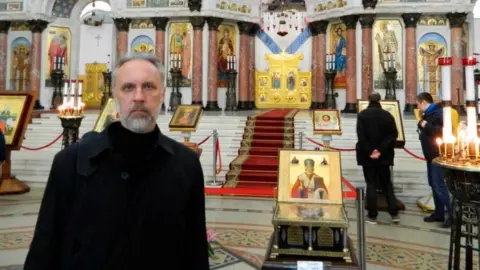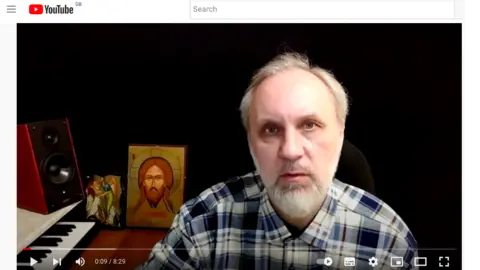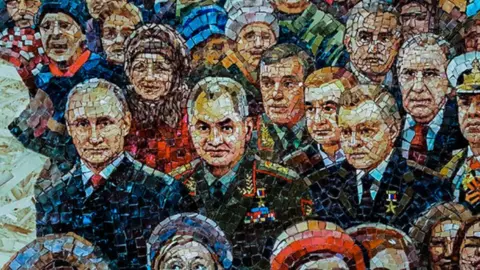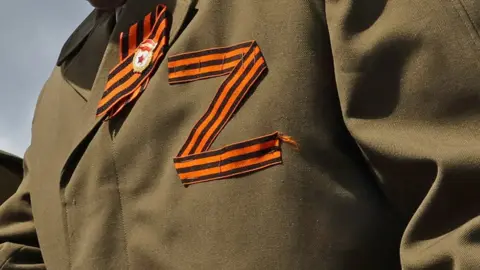Russia-Ukraine war: Priest detained for criticising Putin
 Ioann Kurmoyarov
Ioann KurmoyarovThe officers who raided Father Ioann Kurmoyarov's home reportedly seized his mobile phone, a laptop, two icons, a cassock and a wooden cross.
He was taken to a police station in St Petersburg, and allowed to make one phone call to his family.
He told them he had been arrested.
Father Ioann is believed to be the first priest imprisoned under laws introduced in Russia to punish those who spread information countering the Kremlin's narrative of the war.
"I am a prisoner of conscience, suffering for my beliefs. I consider the charges against me and my detention to be illegal," says Father Ioann now in a statement he dictated to his lawyer in St Petersburg's Kresty Prison.
Father Ioann adds that he is a Christian pacifist whose moral views are entirely based on the commandments of the Gospel and canons of the Russian Orthodox Church.
"Blessed are the peacemakers for they will be called the sons of God," and "Thou shalt not kill," are among the quotes he includes in his statement.
On 12 March, just over two weeks after Vladimir Putin launched his invasion of Ukraine, Father Ioann uploaded an 8 and a half minute video to YouTube.
In it he said that those who unleash aggression would not go to heaven, and that in this case it was not Ukraine that attacked Russia but the other way around.
"You are the aggressors who attacked and killed civilians. You will not be in any kind of heaven, you will be in hell," he says of the Russian leadership.
 YouTube/ПРАВОСЛАВНЫЙ ВИРТУАЛЬНЫЙ ПРИХОД
YouTube/ПРАВОСЛАВНЫЙ ВИРТУАЛЬНЫЙ ПРИХОДIn his video Father Ioann goes on to compare the Russian invasion with violent "jihad" suggesting that bloodthirsty leaders in Moscow should have converted to become "militant Islamists" a theme that he kept returning to.
"We worried but we just didn't expect that he would be arrested," says his brother Alexander Kurmoyarov. He tells me that Father Ioann is currently serving an initial two month detention and is then likely to face trial.
"We thought maybe he would be given a warning by the police, but now we are worried that he will get 10 years in prison," he says, referring to the maximum sentence Father Ioann could receive.
The only visitor to have seen Father Ioann in Kresty Prison is his lawyer Leonid Krikun who says his client appeared to be in good health and also defiant.
"I told Father Ioann that if he pleads guilty he will probably get a shorter sentence, but he refuses to say he has committed any crime," Mr Krikun says.
"He says that he would rather serve a longer sentence than admit any wrong-doing and if that happens he will preach to fellow inmates."
Father Ioann has shown before that he is unafraid of speaking out. He was suspended from the church in 2020 after calling the newly-built Church of the Russian Armed Forces a "pagan temple".
The Cathedral in Moscow was the brainchild of Russian Defence Minister Sergei Shoigu and was due to house frescos that featured President Putin, Josef Stalin as well as scenes that celebrated the Crimean occupation.
In a social media post, Father Ioann said Mr Shoigu should be arrested for offending religious sentiment.
 MBH Media
MBH MediaBut what makes Father Ioann's story all the more unusual is that before he got in trouble with the Russian state, he also had a brush with the Ukrainian security service, the SBU.
Ioann Kurmayarov lived in Vinnytsia in central Ukraine for most of his life, his parents having moved there after his father retired from the Russian army.
"Even as a child he was always very outspoken, always searching for the truth" says his brother Alexander who speaks to me from Vinnytsia.
"It was in the church that he found a place where that search for truth was satisfied," says Alexander.
But in 2017, Father Ioann made the news in Ukraine for an act of defiance.
With Crimea annexed by Russia and parts of the east occupied by Russian-backed forces, Ukraine expanded laws banning Soviet symbols.
But Father Ioann posted pictures of one of the most controversial of them, the St George's ribbon.
He was taken in by police for questioning and the SBU brought administrative charges against him.
 Reuters
ReutersThough the orange and black striped ribbon had been used in commemorations of victory over Nazi Germany, it has been adopted by Russian backed separatists in eastern Ukraine.
"He was not radically pro-Russia, he was standing up for freedom of speech and simply believed the authorities were doing the wrong thing by banning displays of the ribbon," says Alexander.
At the time Father Ioann said he was prepared to pay the fine, worth around $100 (£84.50), but said he would then openly wear the ribbon seeing as he had now paid for the privilege. The Ukrainian case against him was dropped.
He soon moved to Russia where he is already paying a much higher price for speaking out against curbs on freedom of expression.
In April he was defrocked by the Russian Orthodox Church's Moscow Patriarchate, though members of the Russian Orthodox Church Abroad (ROCA) say he has been accepted by them.
More pressing is that he remains behind bars at Detention Centre Number One in Kresty Prison with the prospect of staying there for years. His initial detention period ends on 6 August after which his trial date is due to be set.
"I want him to be found innocent, as a Christian who was talking about Christian values," says Alexander.
"But I worry about what is going to happen now and I worry about his future."
Additional reporting by Harry Farley, Jessy Kaner and Anastasia Lotareva
